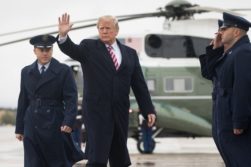
US President Donald Trump is weighing his options on Iran. Illustrative photo, edited for size. Official White House photo by Shealah Craighead.
The United States is readying “very significant sanctions” on Iran after the latter launched a massive attack on Saudi Arabia’s oil infrastructure, according to US President Donald Trump, who further noted his country has more options for a response than just sanctions. “There are many options. And there’s the ultimate option [of going to war], and there are options that are a lot less than that,” said Trump in comments on Wednesday posted to the White House website. “And we’ll see. We’re in a very powerful position.”
Trump, however, appeared to express caution on warfare in his comments to reporters, highlighting the war in Iraq that has dragged on far longer than the US originally envisioned. “There’s plenty of time to do some dastardly things,” said Trump. “It’s very easy to start. And we’ll see what happens… If we have to do something, we’ll do it without hesitation.”
Regardless of whether the US launches retaliatory strikes on Iran, stronger sanctions against the Islamic Republic are promised. Israeli Prime Minister Benjamin Netanyahu expressed his support for that move in a statement on Wednesday.
“Iran’s aggression has increased of late, including in the Gulf, and this is precisely the time to increase pressure and sanctions,” Netanyahu said in comments released by his office. “I am pleased that President Trump has done exactly this.”
The skyrocketing tensions follow an attack on the Saudi’s oil infrastructure that NPR reported shut down more than half of Saudi Arabia’s ability to export oil. The report cited a Saudi military spokesman as 25 drones and missiles were used to attack his country.
The scale of the attack has raised questions on the intensity of the US response to defend their allies the Saudis. The incident also follows Iran expanding their nuclear program and multiple efforts to undercut the oil shipping industry, as well as an attack on a US drone that was discussed by a US Senator again this week.
Trump pushed back against accusations from US Senator Lindsay Graham on Twitter that the Americans’ limited response against Iran’s shooting down of a US drone earlier in the year was viewed by Iran as “a sign of weakness.” Said Trump on Wednesday, “I think it’s a great sign of strength. It’s very easy to attack.”
One day earlier, Vice President Mike Pence quoted Trump’s disinterest in fighting a war with Iran, but also emphasized the US was prepared for any scenario. “In the wake of this weekend’s unprovoked attack on several oil facilities in Saudi Arabia, I promise you: We’re ready,” said Pence on Tuesday in comments published to the White House website. “As the President said, we ‘don’t want war with anybody,’ but the United States is prepared. We’re locked and loaded. And we’re ready to defend our interests and our allies in the region—make no mistake about it.”
On Wednesday, US Secretary of State Mike Pompeo was verbally defending US allies in the Middle East during a visit to the region, calling the Iranian attack an “act of war.”
Pompeo, in comments published by the US State Department, told reporters the weekend’s strike was “an Iranian attack,” and not another strike from the Houthis, the Iranian-backed rebels in Yemen. Pompeo pointed to the sophisticated weaponry—saying they had never seen Iran share such missiles and unmanned aerial vehicles—and the trajectory of the attack, which came from the north. Yemen is to the south of Saudi Arabia, whereas Iran is in the north.
And regardless, Pompeo said Iran was involved in the serious incident and that’s enough. “It’s not the case that you can subcontract out the devastation of five percent of the world’s global energy supply and think that you can absolve yourself of responsibilities,” said Pompeo. “So, I’d say that from the beginning. Were it the case that the Houthis’ fraudulent claim was accurate, were that true—it’s not, but were that true, it doesn’t change the fingerprints of the Ayatollah as having put at risk the global energy supply.”
Despite Pompeo’s strong words, he sounded more inclined towards sanctions than warfare in response to a reporter’s question. Said Pompeo, “You talked about how do you restore deterrence. That’s it—you deny the aggressor the wealth and resources to commit acts of war and terrorism around the world.”
(By Joshua Spurlock, www.themideastupdate.com, September 18, 2019)
